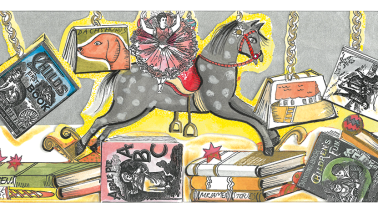This is not the best time to move from East to West. The thought occurs to me as I sit in a British bank, at its Westminster branch no less, waiting to open my first UK account. The procedure takes two hours, stretched across two appointments over two days. In the same period of time, a bank in Singapore — my home for the past 20 years — would not only have set up an account, but offered the customer five credit cards and a housing loan. When international investors like Jim Rogers say Asia is the future because things just move faster there, there’s some truth in it.
•••
I’ve come to London for postgraduate study. It was not the easiest decision to make, hauling myself, mid-career, from Asia to Europe. Especially when so many others are travelling in the other direction. In Singapore, it seemed that every day brought a new planeload of expats, many of them British, all looking for higher bonuses and lower taxes. Singapore, Hong Kong, Shanghai, Beijing — these are the destinations du jour. The West, so the story goes, is in terminal decline. The UK and US are deep in debt; the eurozone is imploding. ‘London is way past its prime,’ a Singaporean colleague warned me.
•••
But if we made all our choices based on economic indicators, life would be truly poor. It’s not a fashionable thing to say, with the new pride and new money that’s sweeping across Asia, but I’ve come to Britain because I find it one of the most inspiring nations on earth. I like the culture and the way of life, and I find the British sense of humour a national asset like no other. Also, I believe the UK still offers the best higher education on the planet. This has not been achieved through national policy, committee-work or government diktat: it’s the glorious culmination of centuries of protecting freedom of thought, speech and debate. When I say this to my British friends, they look at me blankly. But this is still a novelty to those of us from the booming but not entirely liberal East. Freedom of expression has a long and proud tradition in Britain, and I know this liberty has been hard won.
The newspapers these days are full of stories about rising East vs falling West, as though we were all involved in a huge global zero-sum game. But that’s not the whole picture. The West still has political and cultural capital that the East can only dream of. Perhaps the deepest problem the West is facing is not its debts or ‘moral decline’ (whatever that means), but a crisis of confidence. All over Asia, people aspire to a western way of life. Young people, especially, want to emulate the West in the way they dress, eat and talk, in the songs they listen to and the movies they watch. Even China feels the need to make convoluted accusations of tax evasion or whatnot when it jails its more famous dissenters. It’s a tacit admission that the western democratic model is the one that holds water. If not, the Middle Kingdom would just lock up all dissidents without seeing the need for explanation.
•••
So Manchester United has decided to list its shares in Singapore. It’s in debt and Asia is undoubtedly the best place to raise funds. The other side to this tale is the wave of Premier League mania that has swept the East. I used to work in a newsroom where one could dress casually on Fridays, and many men would turn up in the jersey of their favourite club. Singaporean males you wouldn’t otherwise suspect had any proclivities for Anglo-Saxon culture would get all matey and talk about ‘heading down to the pub’. A colleague of mine, born in Sri Lanka, once told me that Nick Hornby’s Fever Pitch is the book that most accurately mirrors his experience. (I forgot to ask him if he’s actually been to Arsenal.) Whenever there’s an Arsenal match on TV, he makes his wife leave the sitting room because he feels her presence affects the outcome.
•••
It’s not just Britain that suffers from an excess of international popularity (a.k.a. an immigration problem). As I left Singapore, there was uproar over a family from China who had complained against their Singaporean neighbours of Indian ethnicity because they tended to cook curry. The family from China could not stand the spicy smells. Tens of thousands of people in Singapore, which is predominantly ethnic Chinese, decided to cook curry on a Sunday as a mark of solidarity with the Indian Singaporean household. Britain is not the only country where curry is a national dish.
Clarissa Tan is a former winner of The Spectator’s Shiva Naipaul prize. She is studying for an MA in creative writing.





Comments